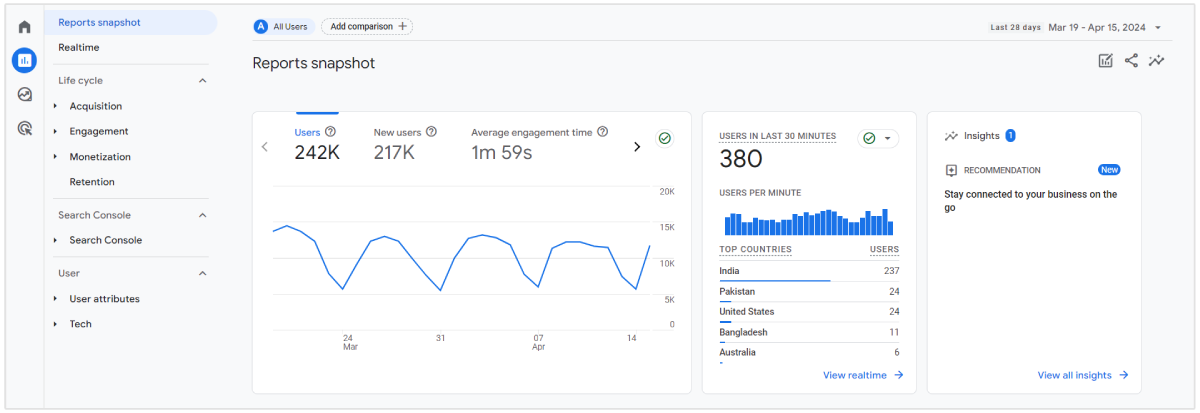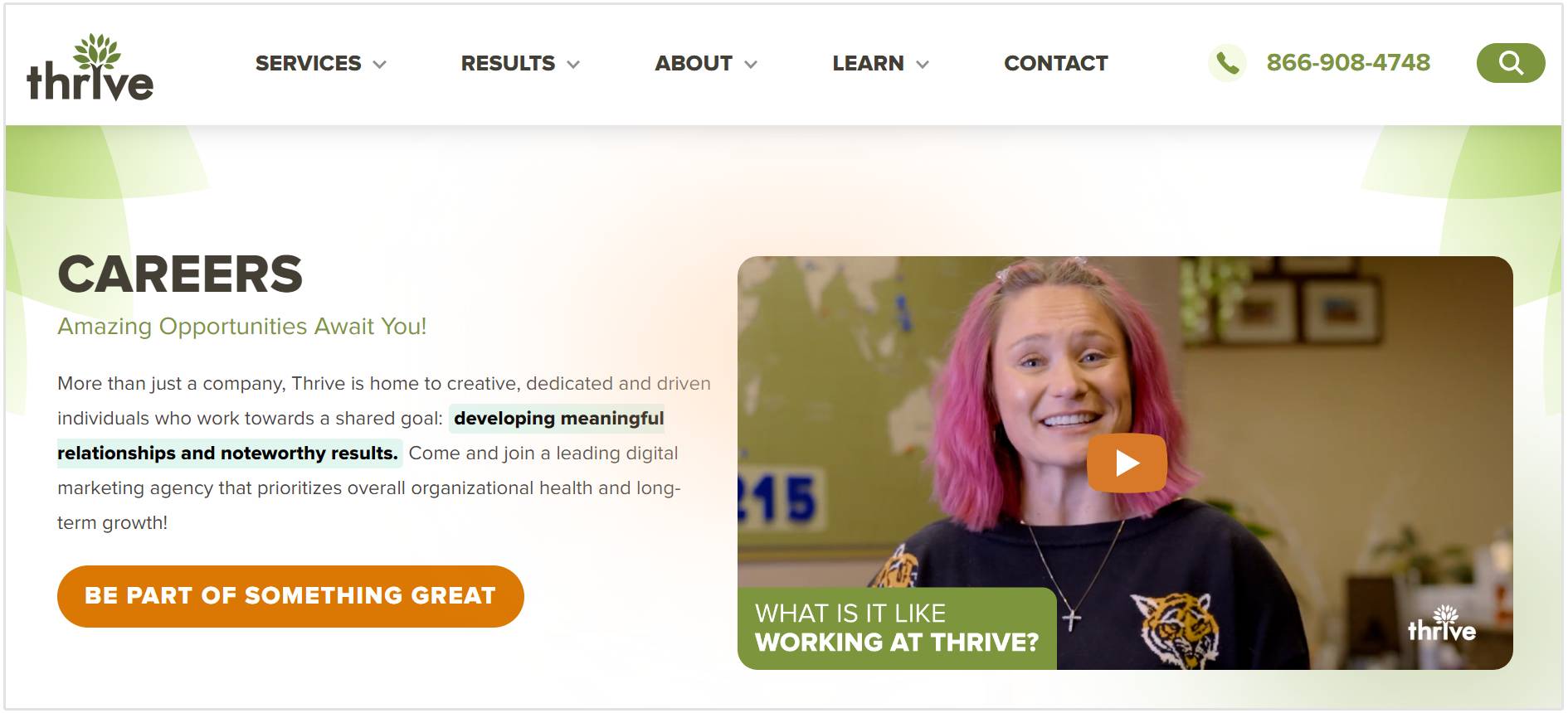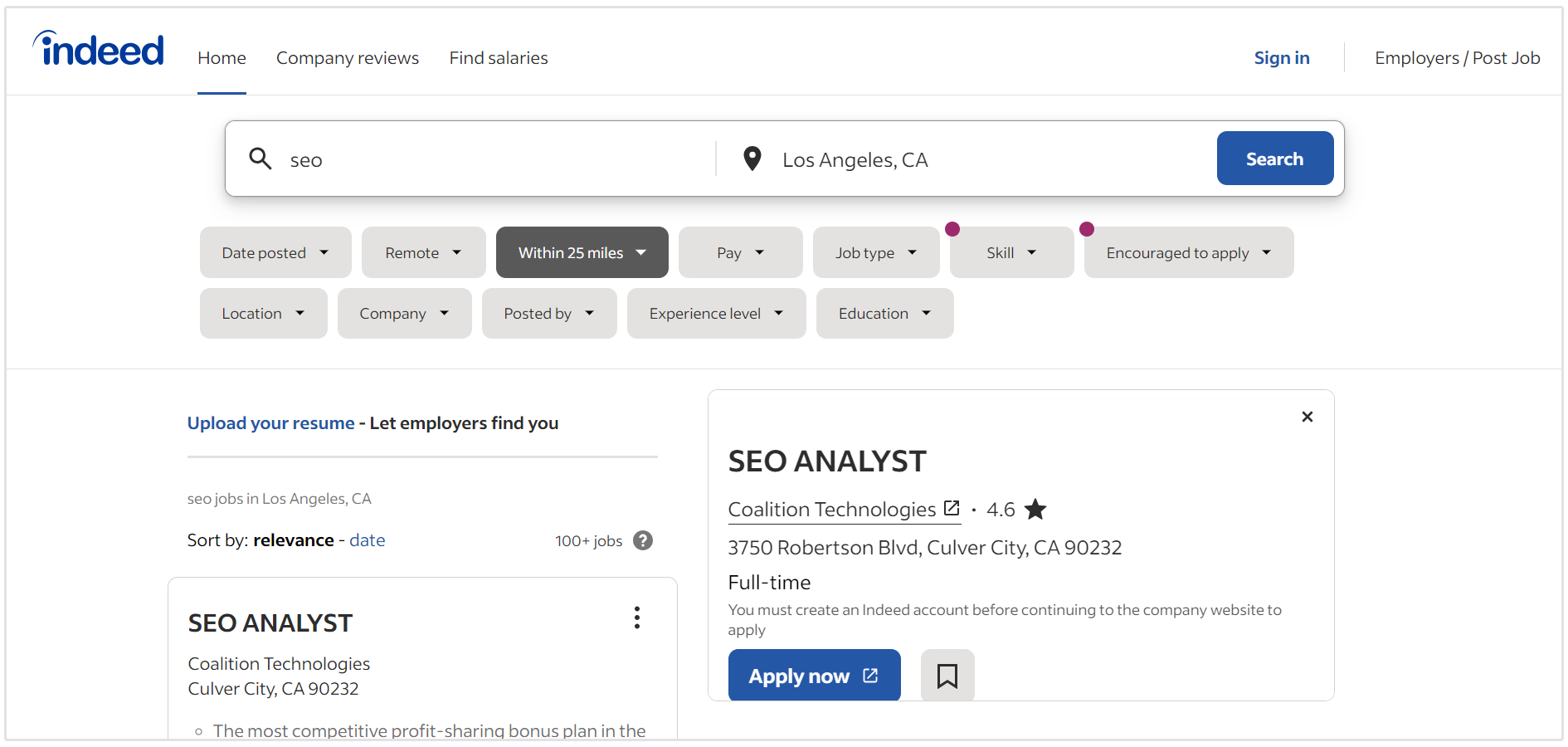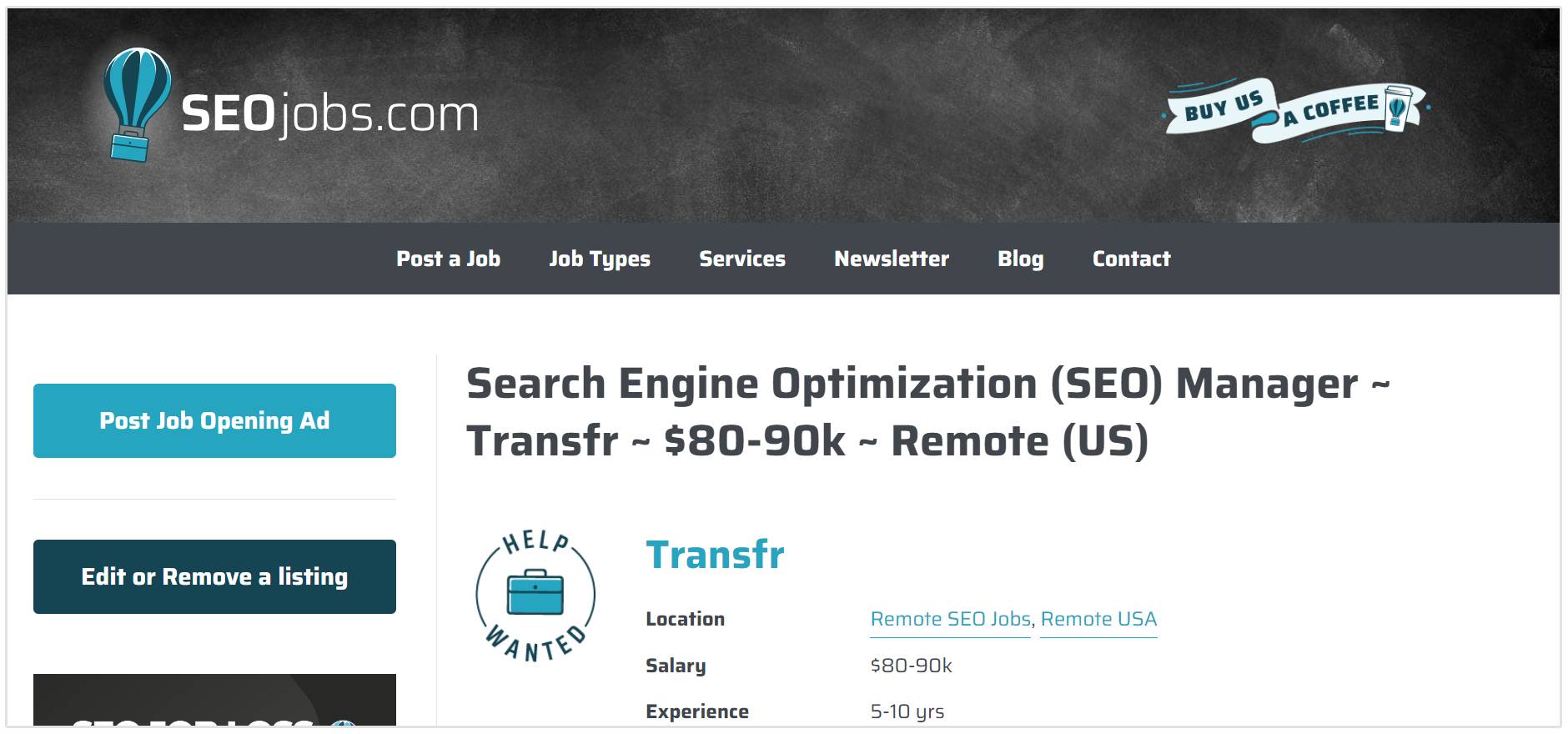
Knowing how to get an SEO job can open doors to a great career.
The SEO industry is going through a transition period with the introduction of AI in Google and Bing, as well as AI-powered search engines such as Perplexity.
However, one thing that won’t change is the demand for skilled SEO professionals and marketers.
According to a report from BrightEdge, 68% of all online experiences start with a search engine and 60% of businesses say that inbound traffic is the highest quality source of leads.
Additionally, data from Business Research Insights suggests that the global market for digital marketing agencies, valued at approximately USD 4.2 billion in 2021, is projected to grow to USD 9.4 billion by 2027.

So we know that businesses will likely continue to depend on search engines to drive targeted traffic, which means SEO jobs will always be in demand.
In this guide, we’ll walk you through the exact steps on how to get an SEO job, including the skills you’ll need, where to find SEO jobs, and tips from people already working in the industry.
By the end of this post, you'll have a clear roadmap to getting an SEO job.
Before we get started, I'd like to thank the following SEO specialists and marketers for their contributions and insights:
- George Bates, SEO Manager at Fluid Ideas, United Kingdom
- Nathan Clark, SEO Strategist at Organix SEO Agency, United States
- Caleb Riutta, Co-Founder of DUSK Digital, United States
- Jessica Hetherington, Marketing Director at Socially Inclined, United States
- Alexander Ang, CEO of Media Funnel, Malaysia
- Vukasin Ilic, Senior SEO Consultant at Linkter, United States
How to Get an SEO Job
Learn SEO
The first step to getting an SEO job is to master the basics of SEO.
Search Engine Optimization (SEO) revolves around optimizing websites to improve their visibility on search engines like Google.
To get an SEO job, you need a solid understanding of key SEO concepts like keyword research, on-page SEO, off-page SEO, technical SEO, and content optimization.
SEO professionals should have a solid understanding of content marketing, as SEO is heavily tied to content.
- George Bates, SEO Manager at Fluid Ideas
So where can you learn these SEO basics if you don’t already know them?
Luckily, the web is filled with some great resources on how to learn SEO.
From online courses to blog posts, anyone with the desire to learn all the elements of SEO can do so.
Here are some of the top resources and places to learn SEO:
- SEO blogs: Stay updated with the latest trends and tips by following reputable blogs such as Moz, Search Engine Journal, and SEOptimer's blog.
- Online courses: Coursera and Udemy offer some great courses on SEO. Check out this post on the best SEO courses you can take.
- Online forums: Engage with the SEO community on platforms like Reddit's SEO community or the Google Webmaster Forum to ask questions and share insights with peers.
Learn How to Use Google Tools
To succeed in SEO, it’s crucial to become proficient with the tools that will help you track, analyze, and optimize your efforts.
Two of the most widely used tools in SEO are Google Analytics and Google Search Console.

Both of these tools provide important insights into how your website is performing in search engines and help you make data-driven decisions to improve your SEO strategy.
- Google Analytics: This tool allows you to track visitor behavior on your website. You can monitor key metrics like page views, bounce rates, average session duration, and where your traffic is coming from. By understanding which pages are performing well and which ones need improvement, you can refine your content and SEO efforts. Google Analytics also helps you track conversions, giving you a clearer view of how your SEO impacts your overall business goals.
- Google Search Console: While Google Analytics provides insights into user behavior, Google Search Console helps you understand how your website is performing in search results. It shows you which keywords are driving traffic to your site, tracks your site's ranking for various queries, and alerts you to any technical issues like crawl errors or mobile usability problems. It’s a powerful tool for monitoring your site’s health and ensuring that search engines are properly indexing your pages.
Create Your Own Website for Your Portfolio
One of the best ways to learn SEO and showcase your skills to potential employers is by creating your own website.
Building your own website or blog is a great way to showcase your abilities and demonstrate that you can rank your own content.
- Nathan Clark, SEO Strategist at Organix SEO Agency
Nothing beats hands-on experience, and working on your own site allows you to experiment with SEO strategies in a real-world setting.
It gives you the freedom to test different approaches, track your progress, and see how search engines respond to your efforts over time.
Creating a website enables you to:
- Apply SEO Theories: You can directly apply what you’ve learned about keyword research, content creation, link building, and technical SEO in a live environment.
- Understand Analytics: You'll be able to use tools like Google Analytics and Google Search Console to monitor traffic, track rankings, and learn how to make data-driven decisions.
- Build a Portfolio: A well-optimized website can serve as a living portfolio, demonstrating your SEO knowledge and growth to potential employers.
- Stay Current: The SEO landscape is always evolving. Having your own site allows you to stay up to date with algorithm changes and experiment with new techniques.
Create an SEO Resume
Once you’ve learned the basics of SEO and gained some hands-on experience—whether through your own website or freelance projects—it’s time to create an SEO resume.
Your resume is a key part of landing an SEO job, as it showcases your skills, experience, and accomplishments in the field.
When creating an SEO resume, make sure to highlight:
- Technical Skills: Include your proficiency with SEO tools like Google Analytics, Google Search Console, and others such as SEOptimer.
- Practical Experience: Mention any personal projects, freelance work, or internships where you’ve applied your SEO knowledge. If you’ve worked on your own website, detail the strategies you implemented and the results you achieved.
- Results & Metrics: Employers love to see tangible outcomes. Include data such as increased organic traffic, improved search rankings, or boosted conversion rates that resulted from your SEO efforts.
- Certifications: If you’ve taken SEO courses or earned certifications, such as from Google Analytics Academy or SEMrush Academy, be sure to list these on your resume.
You can also use AI tools like ChatGPT to create a resume, check out this blog post for ChatGPT resume prompts.
Just like you optimize websites, you need to optimize your resume. Customize it to each job, using relevant SEO keywords from the job listing.
Instead of just saying you “did SEO,” mention how you “increased organic traffic by 30% in six months.”
- Caleb Riutta, Co-Founder of DUSK Digital
How to Prepare for an SEO Interview
SEO interviews often test both your technical knowledge and your problem-solving skills, so it’s important to be ready for a range of questions.
Here are some tips to help you prepare:
Review SEO Fundamentals
Make sure you’re confident in discussing the core aspects of SEO, including on-page and off-page SEO, keyword research, link building, technical SEO, and content optimization.
Be prepared to explain how you approach each of these areas in real-world scenarios.
Be Familiar with SEO Tools
Employers will likely ask about your experience with tools like Google Analytics, Google Search Console, SEOptimer, and others.
Know how to explain the purpose of these tools, and be ready to discuss how you’ve used them in past projects to track progress and make decisions.
In most cases, the job posting will tell you which tools the agency or company uses in their daily operations so focus on these.
For instance, Scorpion Marketing has an open SEO position, and one of the skills they are looking for is, “Proficiency in SEO tools such as Google Analytics, Search Console, and third-party SEO platforms like Ahrefs and SEMRush.”

So if you’re applying for this position, be sure to brush up on you SEMrush and Ahrefs skills.
Prepare for Technical SEO Questions
Many SEO interviews will include technical questions, such as how to optimize site speed, fix crawl issues, or improve mobile usability.
Brush up on key technical SEO concepts so you can confidently explain them during the interview.
Check out this blog post for more than 30 commonly asked SEO interview questions and answers.
You should also be prepared to talk about data about your past achievements and results.
Be prepared to talk numbers—traffic growth, ranking improvements, conversion rates.
- Jessica Hetherington, Marketing Director at Socially Inclined
Showcase Your Problem-Solving Skills
SEO is full of challenges, and interviewers may ask you how you’ve handled tough SEO problems in the past.
Think about times when you faced a difficult SEO issue, like a sudden drop in rankings, and be ready to explain how you identified the problem, took action, and measured the results.
By showcasing your before and after results in Google Search Console or Google Analytics 4 visually to your interviewer is what makes you different from other candidate.
Every company spots talent based on results and performance, not based on tasks.
- Alexander Ang, CEO of Media Funnel
Stay Up-to-Date on SEO Trends
Employers want to hire someone who is proactive and always learning.
Make sure you’re up-to-date on the latest Google algorithm updates, SEO trends, and industry best practices. You could even mention blogs or SEO communities you follow to show that you’re committed to staying current.
Where to Find SEO Jobs
Now that you’re ready to apply for an SEO job, let's look at some of the best places to find an SEO job.
Agency Websites
Many digital marketing and SEO agencies list open positions directly on their websites.
For instance, Thrive Agency has an entire page showing all their open positions.

Agencies are often on the lookout for SEO specialists to manage client accounts, optimize websites, and run ongoing campaigns.
By visiting the career pages of SEO and digital marketing agencies, you can apply directly to roles that interest you. Not only will you avoid job board competition, but it also shows initiative when you reach out to companies directly.
Job Sites
Job sites like LinkedIn, Indeed, and Glassdoor are excellent platforms for finding SEO roles.

These sites allow you to search specifically for SEO jobs, filter by location or remote work, and even set up job alerts to notify you when new positions are posted.
Some specialized SEO and digital marketing job boards, like We Work Remotely and SEOJobs.com, focus solely on roles in the SEO and marketing industry, making them great resources for targeted job searches.

Companies
Large companies often list job openings on their own careers page, including positions for in-house SEO experts.
This direct approach allows you to apply without the intermediary of a job board, increasing your chances of standing out. Research companies that align with your interests and regularly check their websites for new job opportunities.
FAQs: How to Get an SEO Job
Do I need a degree to get a job in SEO?
No, you don’t need a degree to get a job in SEO.
While some companies may prefer candidates with a degree in marketing, communications, or a related field, many SEO professionals have built successful careers without formal education.
In SEO, practical experience and skills matter more than a degree.
Landing a job in SEO comes down to demonstrable case studies.
If you can show and verify that your previous work has significantly increased organic traffic and boosted sales or leads for a business, opportunities will open up.
- Vukasin Ilic, Senior SEO Consultant at Linkter
What skills are needed to get a job in SEO?
To get a job in SEO, you'll need a mix of technical and creative skills.
- Key skills include:
- Keyword research
- On-page SEO
- Technical SEO
- Content creation
- Link building
- Analytical skills
- Problem-solving
- Adaptability
Can I get a job in SEO with no experience?
Yes, you can get a job in SEO with no experience, but it largely depends on the role you're applying for.
Entry-level positions or internships are excellent starting points for newcomers and typically do not require prior experience.
However, for more senior positions, employers usually seek candidates with proven experience and a track record of delivering results. These roles often require a deeper understanding of SEO strategies and a portfolio showcasing successful projects.
How much can I earn from an SEO job?
The salary for an SEO job can vary widely depending on factors such as location, level of experience, and the size of the company.
Here's a general overview of what you might expect:
- Entry-Level Positions: For those just starting in SEO, the average annual salary is around $67,000.
- Senior Positions: Experienced SEO specialists or managers can command salaries ranging from $62,000 to $112,000 annually. Senior roles often require proven expertise in SEO strategies, leadership skills, and the ability to deliver measurable results.
Wrapping up
A career in SEO offers great opportunities for growth and personal development.
By using the strategies and tactics that we mentioned in this blog post, you can put the odds in your favor for getting a job in SEO.
Remember, the key to succeeding in SEO lies in staying adaptable and keeping your skills sharp as the industry evolves.
















